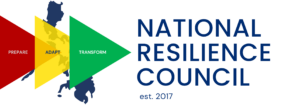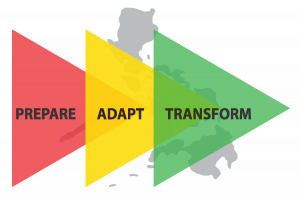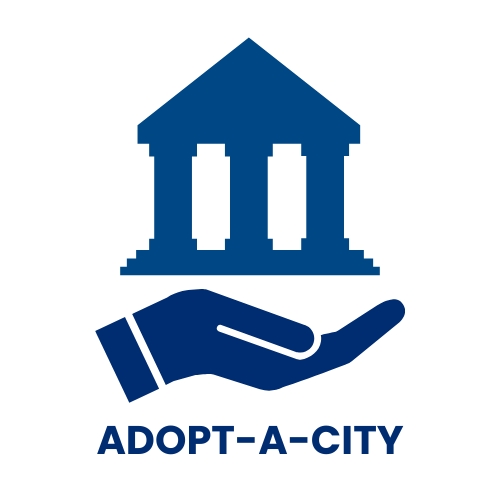The Adopt-A-City (AAC) Initiative is a three-phase (prepare, adapt, and transform) program that facilitates partnerships and investments between the public and private sectors, focusing on the preparedness, prevention, pre-disaster recovery planning, and long-term resilience of local government units (LGUs) toward a Resilient Philippines.
The implementation of this initiative is anchored on the intersecting goals of international development frameworks and agreements such as the Sendai Framework for Disaster Risk Reduction 2015-2030, the 2030 Agenda for Sustainable Development Goals, the Paris Climate Agreement, the Intergovernmental Panel on Climate Change (IPCC), the New Urban Agenda, and Making Cities Resilient 2030 of the United Nations Office for Disaster Risk Reduction (UNDR)., as well as, different national plans and programs, including but not limited to the Philippine Development Plan (PDP), National Disaster Risk Reduction and Management Plan (DRRMP).
This program aims to strengthen the leadership and governance (L&G) capacities of LGUs to achieve resilience in five (5) core areas: (1) human development; (2) local economy; (3) infrastructure; (4) environment; and (5) human security, through a more robust private sector participation in resilience building. This represents an innovative pathway for corporations to collaborate directly with local governments, academic partners, and communities– mainstreaming climate change adaptation and disaster risk reduction (CCA-DRR)– embedding resilience investments as part of the core business value cycles and strategic corporate social responsibility of private sector partners. Thus, allowing corporations to support the reduction of exposure and vulnerability, and the transformation of the climate and disaster risk landscapes of local communities. These investments ensure direct social impact and generate co-benefits by enhancing their sustainability through environmental, social, and corporate governance.
In addition, the implementation of this program aims to:
- Create evidence-informed solutions relevant to climate and disaster resilience.
- Ensure development and business continuity through climate and disaster resilience investments as part of the core business value cycle of corporations.
- Ensure increased private sector participation in disaster prevention and preparedness from city/municipality to household level.
- Engage the youth in using new digital tools for climate change adaptation and disaster risk reduction (CCA-DRR).
The expected outcomes of the program vary according to the level of governance at the national, local, and at the barangay level.
At the national level
Enhanced whole-of-society capacity to bounce forward from disasters.
At the local level
Development and business continuity through evidence-informed risk governance.
At the community/barangay level
Sustained capacity to self-organize to prevent, prepare for, and recover from climate and disaster risks at the household level.
NRC employs five (5) approaches in the implementation of the initiative: (1) incremental; (2) institutional; (3) community; (4) political and administrative; and (5) metrics.
Incremental
Building value on the “Prepare, Adapt, and Transform” phases.
Institutional
Integration of leadership and governance (L&G) and science and technology (S&T) approaches through academe-practitioner partnerships.
Community
Community-based through participatory, multi-stakeholder risk assessment and resilience planning.
Political and Administrative
Building co-ownership of the executive and legislative agenda– translating evidence-informed plans into policies and informed action
Metrics
Use of the Resilient Local Government System Scorecard (RLGSS) and the Barangay Resilience Bingo Scorecard (BRBS) that is validated independently.
As of 2024, NRC is in partnership with thirteen (13) LGUs in the implementation of the Adopt-A-City (AAC) Initiative. This includes a province, a municipality, and eleven (11) cities as follows:
- Provincial Government of Bataan
- Municipal Government of Tiwi, Albay
- City Government of Baguio, Benguet
- City Government of Manila, National Capital Region
- City Government of Iriga, Camarines Sur
- City Government of Naga, Camarines Sur
- City Government of Ormoc, Leyte
- City Government of Iloilo, Iloilo
- City Government of Mandaue, Cebu
- City Government of Cagayan de Oro, Misamis Oriental
- City Government of Iligan, Lanao del Norte
- City Government of Zamboanga, Zamboanga del Sur
To support the realization of this program, NRC also forms meaningful partnerships with private sector partners, as follows:
- SM Prime
- BPI Foundation
- International Container Terminal Services, Inc. (ICTSI) Foundation
- Aboitiz Foundation
- Aboitiz Power
- Pilmico
- Energy Development Corporation (EDC)
- Alliance Global
- Vivant Foundation
- Visayan Electric Company, Inc.
![]()



